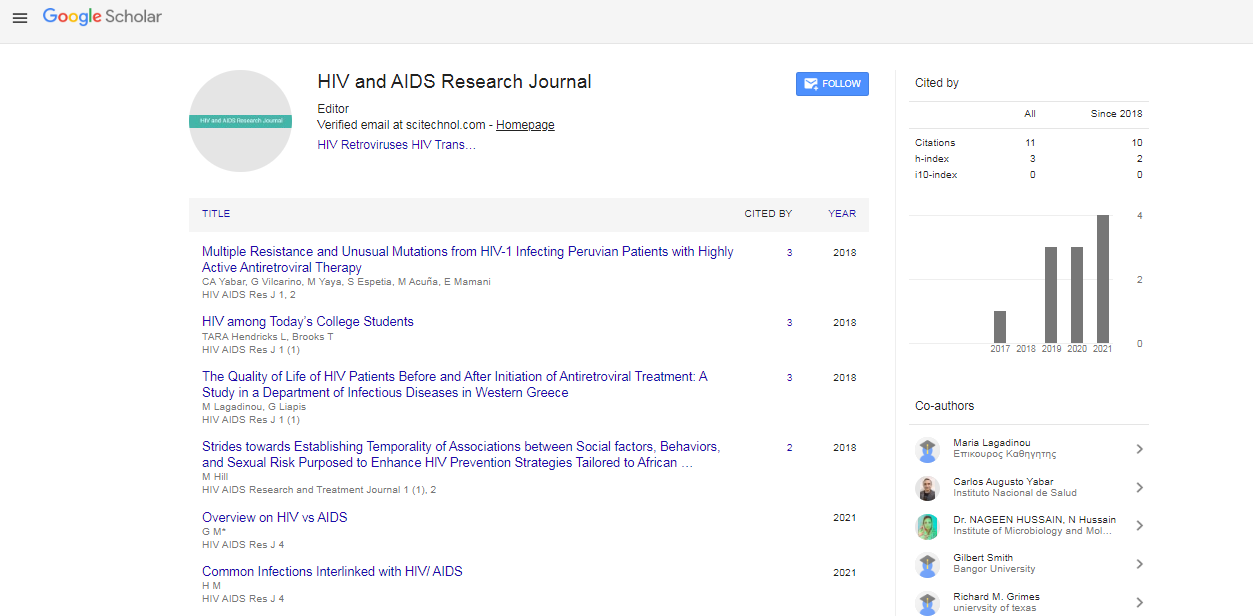Editorial, Hiv Aids Res J Vol: 4 Issue: 3
Overview on HIV vs AIDS
Granado M*
Department of Emergency Medicine, University of Texas Health Science Centre, U.S.A
*Corresponding Author: Granado M Department of Emergency Medicine, University of Texas Health Science Centre, U.S.A, E-Mail: grandom345@medchem.us
Received: April 06, 2020 Accepted: April 17, 2020 Published: May 04, 2020
Keywords: immune system, infectious disease., AIDS,
Introduction
It is common to switch up HIV and AIDS. They are distinct diagnostic tests, but they have been linked: HIV is a virus that could also lead to AIDS, also recognised as stage 3 HIV. A diagnosis of HIV or AIDS was again taken into account a death sentence. People with HIV at any phase are now living long and productive lives as a result of research for the development of experimental therapies. An HIV-positive person who takes anti - retroviral therapy medication on a routine basis can life expectancy a near-normal life. Hiv attacks that can affect the immune system. "HIV" is an abbreviation for human immunodeficiency virus. This same name aptly represents the virus: it can only be contracted by living beings and threats the immune system. As a result, the immune system has been unable to function as well as it should. Many viruses can be totally eradicated by our autoimmune, but HIV is not one of them. Medications, on the other hand, can effectively control HIV by interrupting its viral life cycle. While HIV is a viral infection that can lead to infection, AIDS (acronym for acquired immunodeficiency syndrome) is a disease. HIV infection can assist in the growth of AIDS.
AIDS, also known as stage 3 HIV, takes place when HIV has caused significant immune response damage. It is a complex condition with varying symptoms from individual to individual. Signs of stage 3 HIV are linked to infectious diseases that a person may grow as a consequence of having damage to the immune system that is unable to fight them as effectively. Tuberculosis, pneumonia, and other infections are examples of opportunistic infections. Definite forms of cancer become much more likely when the immune system functions inefficiently. Adherence to antiretroviral treatment can prevent the formation of stage 3 HIV. The virus spreads from person to person through the return of body fluid. HIV has been most usually transmitted through sex without using condoms or common syringes. In rare cases, a mother can pass the infection to her child while pregnant. Because HIV is a virus, it, like many other virus infections, can be spread from person to person. AIDS, on the other hand, is a condition that a qualitative technique after HIV transmission. Approximately two to four weeks after transmitting, HIV typically causes flu-like signs. This brief period of infectious disease is referred to as acute infection. The immune response controls the infection, resulting in a period of stagnation. The immune response cannot completely eradicate HIV, but can keep it under control for decades. Throughout this latency period, which can last years, a person infected with HIV may have no signs at all. However, if that person does not receive antiretroviral treatment, he or she may develop AIDS and experience many of the symptoms associated with chronic illness. When HIV is transferred, the immune system's response by producing antibodies against by the virus. To assess if the virus is present, a blood or saliva test can detect those antibodies. The HIV antibody test may not be positive for several weeks after transmission. Antigens, which are proteins generated by the virus, and monoclonal antibody are also looked for in another test. This test can detect HIV as early as a few days after infectious disease.
 Spanish
Spanish  Chinese
Chinese  Russian
Russian  German
German  French
French  Japanese
Japanese  Portuguese
Portuguese  Hindi
Hindi 